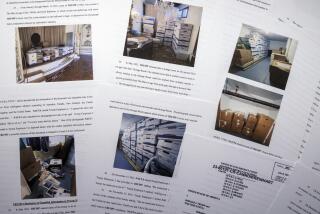Judges’ Feud Over Work Hours Leads to Secret Judicial Review
- Share via
A long-running feud between a former presiding judge of the Superior Court and another judge has led to a secret hearing before the state Commission on Judicial Performance over a matter that one former colleague characterized as “less than a spitting-on-the-sidewalk offense.”
Richard J. Beacom, the former presiding judge, claimed that Theodore E. Millard was insubordinate last year when he refused to do all the work assigned to him during a two-month stint on the law and motion panel, courthouse sources said.
The panel, which resolves pretrial legal issues, was the court’s busiest panel at the time as three judges grappled with more than 350 cases a week.
“This is less than a spitting-on-the-sidewalk offense,” said former Superior Court Judge William Sheffield, who said he declined to return from Yale Divinity School two weeks ago to testify at the secret hearing.
“I thought it was just a personality conflict between Beacom and Millard,” Sheffield said in a telephone interview.
Following legal restrictions, Beacom, Millard and commission Director Jack E. Frankel have refused even to acknowledge that a complaint has been filed. The commission has the power to investigate complaints against judges and to recommend disciplinary action, including removal, to the state Supreme Court.
According to a court source, Beacom’s complaint against Millard led Millard to seek a full hearing before a three-judge panel. Millard cited a feud with Beacom that went back to their days in the district attorney’s office in the late 1960s and early 1970s.
Filling in for Sheffield in January and February, 1984, Millard found that the workload of the judges on the law and motion panel was the heaviest he had encountered since being elected in 1978.
As a trial judge, he said last year, he could go home about 5 p.m. or so and leave his work at the courthouse. But as a law and motion judge, he said, he had to take cases home with him and sometimes read until 11 p.m., as did the other judges on the panel.
Millard rebelled against the workload in a flurry of letters to Beacom and other Superior Court judges in mid-February. He claimed that, under the state Constitution and state court rules, the work of the Superior Court must be divided evenly among all the judges.
The letters and a notice posted outside his courtroom door said he refused to hear oral arguments in any case in which he hadn’t finished reading the written motions and arguments by 6:30 p.m. on the previous day.
In one case, lawyers who had come from San Francisco for a scheduled hearing were turned away by Millard, a move that infuriated Beacom. As presiding judge, Beacom said then, he could have reassigned the case but didn’t because other judges were just as busy.
The lawyers bounced back and forth several times between Millard and Beacom until the presiding judge called Millard to remind him who had the assignment power. The case was continued to another day.
Millard conceded then that he probably had engendered the dislike of many of his colleagues, as he did when he ran against an incumbent judge in 1978.
Some of his colleagues also accused him of playing politics while seeking reelection last year in a nonpartisan race. By not complaining until two days after he was required to declare his intent to seek reelection, Millard avoided a display of contentiousness that might have prompted a candidate to file against him, they said.
The other law and motion judges also were upset with Millard, mainly because they needed Beacom on their side to help push through new rules to ease the burden or to get more judges for the panel. But, as Sheffield said, they had “empathy” for Millard.
“As long as I’ve known him on the bench, he was a hard worker,” Sheffield said. “I think he’s a good judge.”
He did not want to testify at the commission hearings, he said, because he had final examinations at Yale and because the judges’ fight “was not worthy of anybody’s participation.”
More to Read
Sign up for Essential California
The most important California stories and recommendations in your inbox every morning.
You may occasionally receive promotional content from the Los Angeles Times.













